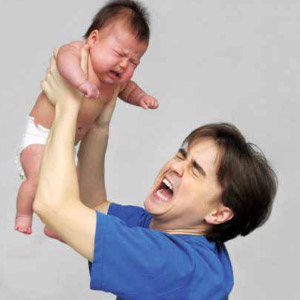Seeing baby for the first time is often a joyous occasion that will fill you with pride and excitement. However, the reality of the situation can be mentally and emotionally wearing – this may include sleepless nights, and baby crying and screaming for care and attention.
Things may begin to slide from there and you may begin to feel more and more miserable. You may become more easily irritated and stress at work may cause you to constantly lose your temper with your wife. Or it’s possible that you may drink more or withdraw from people.
An emerging phenomenon
These are all signs of Paternal Post-Partum Depression (PPPD) which occur in men, and it is now becoming recognised that postpartum depression is not the sole bailiwick of women. It was reported in the Journal of the American Medical Association that prenatal and postpartum depression happens in roughly 1 out of 10 men and this figure was relatively higher three to six months after baby is born.
However, little is known at present about the prevalence, risk factors, and effects of depression among new fathers. The prevailing thought is that fathers face an increased risk of depression both postpartum and during his spouse’s pregnancy.
How to spot it
Generally, most men are far more likely to be in denial about their depression which often times worsens the symptoms. The best person to spot any behavioural changes is one’s spouse, and the main things to watch out for include:
Classic Symptoms of Depression
- Depressed, sad mood
- Loss of interest or pleasure
- Significant weight loss or gain
- Trouble sleeping or over-sleeping
- Restlessness (unable to stay still or slow down)
- Fatigue, loss of energy, or tired all the time
- Worthless or guilty feelings
- Poor concentration, difficulty making decisions
- Constantly thinking of death or suicide
Remember that you do not need to experience all these symptoms to be depressed. Equally important is the intensity of the symptoms, not just the number of symptoms that manifest. Always keep in mind the fact that this is a highly treatable condition. There is absolutely no reason for you to continue suffering from them. While postpartum depression in men is a serious (and in extreme cases even life-threatening) condition, you can recover from it.

How you can cope
There are a few things you can do to manage this problem:
One of the most important is to ensure that you do not neglect yourself. While it is important to take care of your baby, it is equally important to take care of your own needs. Make sure you get enough rest, eat healthily, and believe in yourself as a father.
Always remember that your spouse is your partner. Instead of keeping all your feelings bottled up, share them with her. Regardless of whether or not she can do anything about them, sharing your feelings allows you to talk through your emotional states and thoughts. Sometimes, that’s all it takes for you to feel less burdened!
You are not alone!
Postpartum depression is a medical issue that should be addressed, not shunted aside or ignored. Make it a point to seek help – you can consult a doctor or psychologist who can guide you on how you can handle it. In addition to medical/professional help, you can also talk to your family and friends. Remember, the first step is to acknowledge that you have PPPD and to know that you are not alone.
It will take courage, determination, and a desire to overcome PPPD – the best way to accomplish this is by taking positive action such as seeking medical/professional advice and otherwise confronting it head-on. Don’t wait if you think that you may have any kind of negative feelings toward yourself or your baby. Don’t suffer any longer than necessary, get help now.
An educational collaboration with Malaysian Psychiatric Association.



Comments